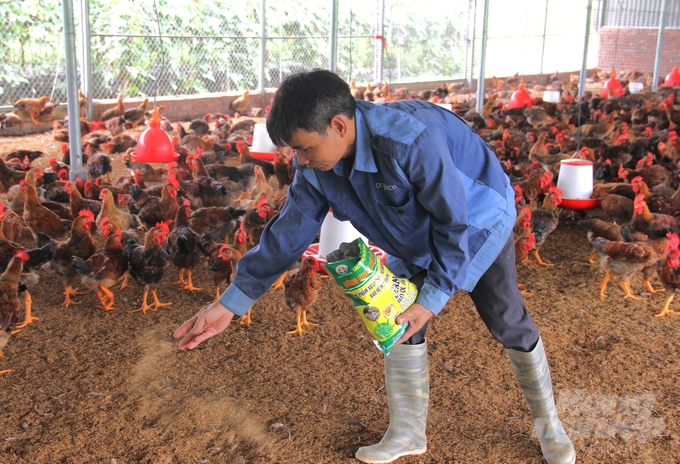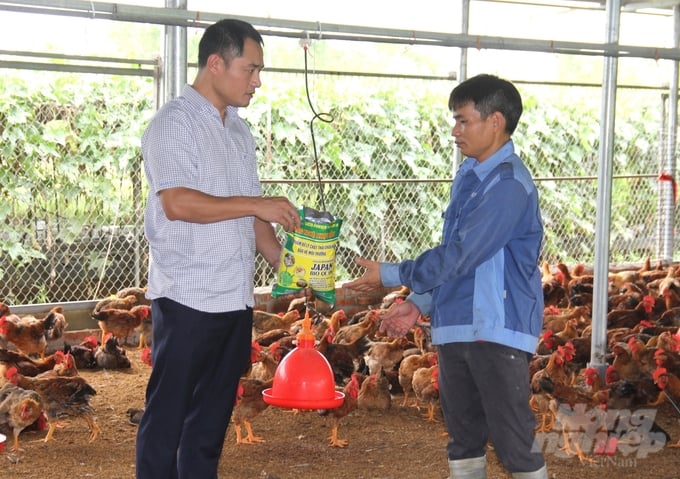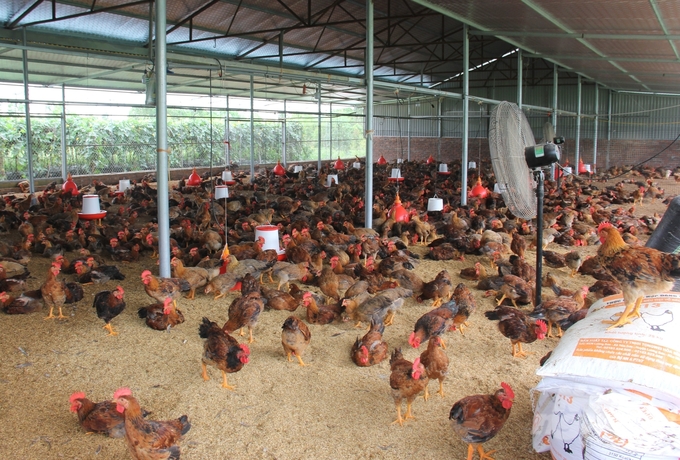December 5, 2025 | 00:32 GMT +7
December 5, 2025 | 00:32 GMT +7
Hotline: 0913.378.918
December 5, 2025 | 00:32 GMT +7
Hotline: 0913.378.918

In order to successfully raise chickens in a biosafety-based manner, farmers must stay dedicated and persistent, not cutting corners on technical procedures. Photo: Trung Quan.
In recent days, the chicken farm of Nguyen Van Tuy's family in Thiet Trung residential group, Ba Hien town (Binh Xuyen, Vinh Phuc) has many people in the area paying a visit to learn about the "fruit" of experience thanks to the application of bio-safe farming techniques.
“The family has two chicken farms with an area of 400 m2. Previously, raising too many chickens using traditional methods often caused them to get sick, consuming a lot of labor and money to buy materials to prevent and treat diseases,” said Tuy.
He was one of many households that received support from the provincial Agricultural Extension Center in 2024 to boldly switch to bio-safe farming. He did not really trust the method at first, and only applied the new farming method on a 300 m2 farm with 2,000 chickens, the remaining farm (100 m2) was raised using the old method.
Bio-safe chicken farming may sound abstract, but Tuy believes the techniques involved are not difficult and not much different from traditional farming methods. “The biggest difference is that farmers must stay dedicated and persistent, not cutting corners on technical procedures”.
Instead of using many synthetic antibiotics to prevent and treat diseases in chickens, his family increases the use of safe products such as pickled garlic and garlic yeast to improve poultry resistance. Biological products are applied to treat the barn floor, and he mixes them with rice husks to create bedding to reduce dust and the stench of waste.
Creating biological bedding for the farm helps the family avoid having to change the rice husks frequently (only after a batch of chickens). The chickens grow and develop healthily, respiratory diseases and diarrhea are significantly reduced. The chickens are always in form and reach good weight when sold. After conducting detailed calculations, Tuy’s family can reduce 30 - 40% of the cost of buying antibiotics and labor compared to before.
“The batch of 2,000 chickens using bio-safe farming techniques was just sold for VND 52,000/kg. After deducting all expenses, the profit was more than VND 30 million. I then let the farm rest for half a month, treating it with lime powder, and spraying disinfectants. We will continue to put in 3,000 chickens to ensure the supply at the end of the year. We have mastered the new method, so the farming work feels less stressful and I feel more confident. This is what gives me the most joy these days,” Tuy said.

Officers from Vinh Phuc Agricultural Extension Center guide households on bio-safe farming techniques. Photo: Trung Quan.
According to Vu Hoang Lan, Head of the Department of Livestock Production and Aquaculture Extension (Vinh Phuc Agricultural Extension Center), chicken farming activities of local people in the province have increasingly developed in recent years. The total number of chicken herds in the province is currently more than 11 million, making an important contribution to the overall development of the agricultural sector.
However the production scale of most households remains small, and waste treatment technology is limited, potentially causing the risk of disease outbreaks and food safety loss. Therefore, developing livestock farming according to VietGAP and biosafety standards is the optimal solution to prevent risks and save costs for farmers.
Based on the implementation of Vinh Phuc province’s agricultural extension program for the period 2020 - 2025, this year Vinh Phuc Agricultural Extension Center will deploy a livestock model following VietGAHP standards with a scale of 30,000 commercial chickens.
Participating households will be supported with 50% of the cost of chicken breeds, feed, veterinary medicine, and disinfectants, and 70% of the cost of granting VietGAHP certificates to livestock facilities that are cooperatives or cooperative groups. Training courses on farming, management, and supervision techniques will be organized so that people can grasp the knowledge and proactively apply it effectively in reality.

Bio-safe livestock farming will help farmers save a lot of costs and increase profits. Photo: Trung Quan.
Since the bio-safe livestock production program was implemented, all participating households have experienced positive changes, and livestock profits have continuously increased year by year because of their mastery of the techniques.
On the other hand, neighboring households have practical models to compare, contrast, and learn from. When they see the effectiveness, they proactively apply and replicate the models even without the regular support of agricultural extension officers in the early stages.
Translated by Samuel Pham

(VAN) As of 2025, the ASEAN region has a total of 69 ASEAN Heritage Parks recognized across its 10 member states. Among them, Viet Nam contributes 15 ASEAN Heritage Parks.

(VAN) Yok Don National Park has high biodiversity with numerous endemic plant and animal species, and it is also the only dipterocarp forest ecosystem conservation area in Viet Nam.

(VAN) Viet Nam and Brunei signed two important MOUs on fisheries and IUU, expanding cooperation in agriculture, the environment, and Halal exports, aiming to substantively implement joint projects.

(VAN) The Viet Nam Coconut Association worked with the International Finance Corporation (IFC) and businesses to promote the supply chain, enhance competitiveness, and develop the coconut industry sustainably.
![Hue aims for Net Zero: [2] Pioneering low-emission tourism](https://t.ex-cdn.com/nongnghiepmoitruong.vn/608w/files/huytd/2025/12/04/0633-dulichzero-4-095634_236-161125.jpg)
(VAN) The ancient capital of Hue has developed Net Zero tourism products and models, aiming to reduce carbon emissions and pioneer the establishment of Viet Nam's green tourism destination.

(VAN) C.P. Viet Nam has announced the successful completion of its goal to plant 1.5 million trees during the 2021-2025 period, a key milestone within company's long-term ESG strategy and its roadmap for emission reduction.

(VAN) This is an initiative of MAE aimed at creating a unified coordination mechanism to implement agricultural cooperation programs with developing countries.